You wanna buy a duck… you nah-sty man? For our last Radio Round-Up of the month, we present the zany radio comedian Joe Penner!
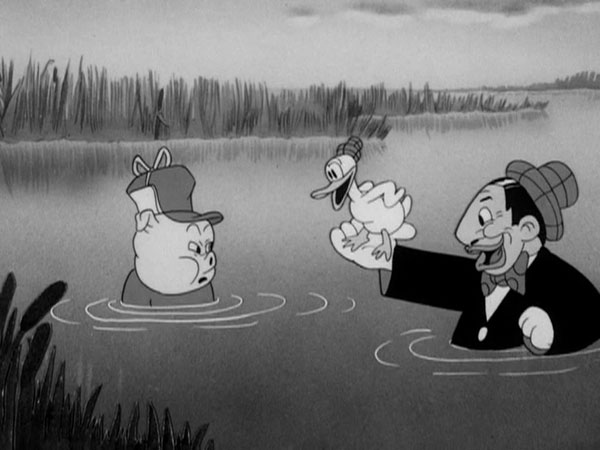
Joe Penner was born as József Pintér in Nagybecskerek, located in the Austro-Hungarian Empire (and now a part of Serbia) in 1904. In 1907, his mother and father emigrated to the United States and settled in Detroit. Penner and his grandfather arrived in 1913. Though his early education in kindergarten proved difficult, due to his inability to speak English, he soon sold magazines, entered amateur contests and became an assistant to a mind-reading act. At the age of 16, he left home and broke into vaudeville and burlesque shows, using a cigar in his performance to emphasize maturity despite his young age. By 1926, he was a headliner in The Greenwich Village Follies. There he met chorus girl Eleanor Mae Vogt, whom he married later two years later.
 In 1929, a theater manager in Pittsburgh let Penner audition for a radio program but the venture was a disappointment; the crew did not respond to his usual theater routine.
In 1929, a theater manager in Pittsburgh let Penner audition for a radio program but the venture was a disappointment; the crew did not respond to his usual theater routine.
Meanwhile, Penner did his earliest film work in a series of live-action short subjects for Warner Bros. between 1930 and 1932. In 1933, his wife Eleanor persuaded her husband to consider another try at radio. Penner made a guest appearance on Rudy Vallee’s popular NBC variety program The Fleischmann’s Yeast Hour on July 13th.
Upon his introduction on the show, Penner delivered a “hyuk-hyuk-hyuk” laugh and spoke in an exaggerated nasally voice and slight lisp, as he uttered, “You wanna buy a duck?” (The line itself was previously used as an ad-lib by Penner during a 1931 vaudeville performance in Birmingham, Alabama, which evidently met with howling laughter.) In the same appearance, when Vallee nor his brother (which he does not have) do not consider buying a duck “under no circumstances,” Penner shouts, “You nah-sty man!” Near the end, Vallee steals Penner’s punch line to a joke a second time, which elicits a baby cry as his guest shouts, “Don’t ever do-o-o-o that!”
Within three months of the initial guest spot—and following five other appearances on Fleischmann’s Yeast Hour—Penner was given his own half-hour program, The Baker’s Broadcast through the same ad agency, J. Walter Thompson; the program debuted on the NBC Blue Network on October 8th, 1933. The program garnered high ratings and became very popular with children. His aggressive comic shtick, however limited it seemed to some, appealed to Depression-era listeners in need of a distraction. The zeal for Penner’s childish, brassy personality led to merchandising, mostly marketed towards a younger audience, noteworthy considering the later sponsors for his radio shows.
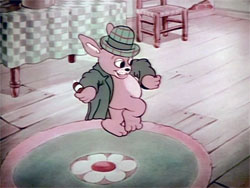
My Green Fedora (1935)
The Baker’s Broadcast continued until 1935, when Penner took a hiatus from radio and relocated to California to secure movie work. In Hollywood, he appeared in a series of college-themed musicals for Paramount. During the fall of 1936, Penner began a new CBS radio series from Hollywood entitled The Park Avenue Penners, sponsored by Cocomalt. By the time he started in West Coast radio, he attempted to evolve his act into a situational comedy as the “black sheep” of a socialite family. In a sponsored—and self-referential—sketch from the November 29, 1936 broadcast, radio mimic Dave Weber (also known as Danny Webb) imitated the “old Joe” in front of Penner himself. Here is an audio excerpt from the program—the “Gene” he mentions is Gene Austin, a regular vocalist on the show:
The cast of the Park Avenue Penners program was a diverse talent pool also used in animated films, such as Martha Wentworth and Phil Kramer (the emcee in Avery’s Hamateur Night). One of the new cast members, Mel Blanc, gained one of his earliest roles on a national radio program, when he auditioned for Penner’s duck “Goo-Goo” in late 1936. In his memoir, That’s Not All Folks, Blanc remembered after the audition, “the door flew open and he hustled into the studio…he pumped my hand and spouted superlatives as if he’d just discovered a cure for polio. ‘Why the heck didn’t you come to me before? I could have used you in so many sketches!’”
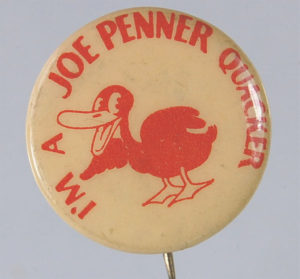 As The Park Avenue Penners continued throughout 1937, Tex Avery devised Egghead, a human character with a bulbous nose and an egg-shaped head. He appeared in twelve cartoons where in about half of them (some directed by the two directorial units teamed with Cal Dalton), Danny Webb used his impersonation of Joe Penner. The Warners cartoons alluded to Penner’s material in other ways; musical composer Carl Stalling inserted Penner’s signature theme song “When the Pussy Willow Whispers to the Catnip” as “Prince Charming” is introduced in Avery’s Cinderella Meets Fella (1938).
As The Park Avenue Penners continued throughout 1937, Tex Avery devised Egghead, a human character with a bulbous nose and an egg-shaped head. He appeared in twelve cartoons where in about half of them (some directed by the two directorial units teamed with Cal Dalton), Danny Webb used his impersonation of Joe Penner. The Warners cartoons alluded to Penner’s material in other ways; musical composer Carl Stalling inserted Penner’s signature theme song “When the Pussy Willow Whispers to the Catnip” as “Prince Charming” is introduced in Avery’s Cinderella Meets Fella (1938).
The ratings for Penner’s new program soon plummeted, and his roles in B-comedies at RKO did not augment his film career. In the fall of 1938, he continued on radio at CBS with his show re-titled Time Out for Huskies for Huskies Cereal. In another swipe at himself in the December 23rd, 1938 broadcast, Penner portrays Scrooge in an ersatz version of the Dickens classic, where the Ghost of Christmas Past transports him back to the past. There, he hears his past self mindlessly spouting off his signature catch phrases that marked his Fleischmann’s debut, much to the present Joe’s sheer displeasure—again, Danny Webb played the “old Joe”. Penner switched sponsors the next year with The Tip Top Show for the NBC Blue Network, for Tip Top Bread, which lasted until April 1940. Penner also appeared in a dual role in Universal’s adaptation of the Broadway production The Boys from Syracuse (1940).
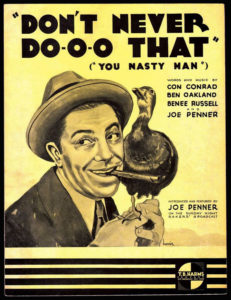 In his memoir, Mel Blanc explained Penner’s inner turmoil that led to his decision to leave The Baker’s Broadcast a few years earlier: “He received a fan letter that essentially said, ‘Your duck routine stinks, and I’m never going to listen to you again.’ Now, most actors form thick skins against such criticisms and would simply have tossed the epistle in the nearest wastebasket without a second thought, but Joe was extremely sensitive and let it gnaw at him.”
In his memoir, Mel Blanc explained Penner’s inner turmoil that led to his decision to leave The Baker’s Broadcast a few years earlier: “He received a fan letter that essentially said, ‘Your duck routine stinks, and I’m never going to listen to you again.’ Now, most actors form thick skins against such criticisms and would simply have tossed the epistle in the nearest wastebasket without a second thought, but Joe was extremely sensitive and let it gnaw at him.”
In early 1941, Penner went on tour for a stage production of Yokel Boy, where he performed at the Locust Theater in Philadelphia. Unfortunately, when he retired to his room, he succumbed to a heart attack in his sleep and passed away at the age of 36. Penner’s success in the 1930s shares similarities to oddball characters that became an admired trend with audiences—a striking example being Paul Reubens’ Pee-Wee Herman much later in the 1980s and early 1990s. Because of his early death, his presence was missed during the dawn of television, which could have bolstered his career.
There are not many episodes of The Baker’s Broadcast that exist or are available online, so no instance of Penner saying another catchphrase from the program “Woe is me” will be found in the video below.
In Collegiate (1936), Penner tried a new catchphrase, “Policeman! Policema-a-an!” which is referenced in Cinderella Meets Fella (1938), but the film is inaccessible as of this writing. Here’s a video for you all to enjoy, starting with Penner’s big debut on The Fleischmann’s Yeast Hour in 1933:
Clips included
My Green Fedora (WB/1935), Cinderella Meets Fella (WB/1938), Porky’s Duck Hunt (WB/1937), Mother Goose Goes Hollywood (Disney/1938), The Big Birdcast (Mintz/1938), Can You Take It (Fleischer/1934), Rasslin’ Round (Iwerks/1934), Porky in the North Woods (WB/1936), Balloon Land (Iwerks/1935), Ali Baba Bound (WB/1940), A-Lad-In Bagdad (WB/1938), Farm Frolics (WB/1941); Count Me Out (WB/1938), Boy Meets Dog (Lantz/1938), Yokel Boy Makes Good (Lantz/1938)
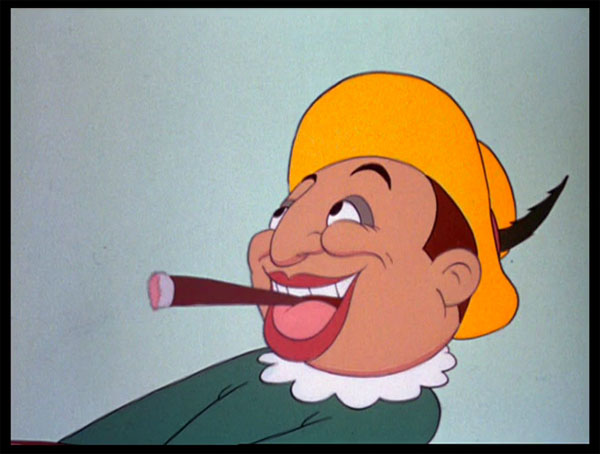
From Walt Disney’s “Mother Goose Goes Hollywood” (1938)
(Thanks to Keith Scott, Eric Costello and Frank Young for their help.)


 DEVON BAXTER is a film restoration artist, video editor, and animation researcher/writer currently residing in Pennsylvania. He also hosts a
DEVON BAXTER is a film restoration artist, video editor, and animation researcher/writer currently residing in Pennsylvania. He also hosts a 




















































































Joe Penner was popular enough with children that the Marx toy company issued a lithographed tinplate windup toy of him that would walk along with hat and cigar bobbing. In one hand he’s holding “Goo Goo” and in the other, a basket of ducks on which is printed, “You Wanna Buy a Duck?” Photos of the toy can be found online on several places.
And thanks to you and them from me,too!
There was a “You nasty man!” in the Betty Boop short JUDGE FOR A DAY (1935). I should also note that Penner attended the premiere of Disney’s SNOW WHITE AND THE SEVEN DWARFS (1937) and was interviewed on the red carpet during NBC’s broadcast of the festivities.
Unlike some of the other catchphrases lifted from radio, these from Joe Penner don’t do much for me. I’m glad Tex Avery got Egghead out of his system early on, he wasn’t that great of a character despite some decent gags in Egghead’s cartoons.
As always, thanks for these posts, and now, once again, I can attest to the fact that Warner Brothers cartoons are *NOT* meant for kids alone, although the characters did eventually become part of our Saturday morning lineup. As a side note, does anyone know who voiced the Peter Rabbit character singing “MY GREEN FEDORA”? Was he a child actor and did he actually appear in any live action films that one could match what he did for the cartoons?
Wasn’t it child actor Tommy Bond (who did Al Jolson and some others)?
I’m willing to venture that Daws Butler’s character ‘Clutcher’ from the Tom Slick cartoon was a tribute to Joe Penner, although I don’t think Penner ever used the phrase “Yes, master.”
Frank Fontaine impersonation, maybe?
Thanks for a nice summation, Devon. I actually enjoy the Penner show as an interesting artifact of 1930s pop culture, and his essentially cartoonish persona meant his animated equivalent worked well as an oddball character like Egghead, or simply as a caricature of himself. This was the same as the cartoon-like Red Skelton in the 1940s, whose various radio aliases were used often by animation directors. Penner was bigger than many people assume, and was highly rated for the first two years in Hollywood, 1936-38, by a large kid audience on radio. His air show was responsible too for the use of many stooges who got cartoon assignments directly because of Penner’s show: Phil Kramer played Butch Smutch weekly for a year or so, and others included Blanc, Weber, Harry Lang, Martha Wentworth, Lillian Randolph, Pinto Colvig, Billy Bletcher and several more. Clampett said he and Tex Avery listened to movies and radio shows closely for voice ideas, and Penner was mentioned. For comedy aficionados the show should be preserved for its many vaudeville routines including a few Abbott & Costello-esque cross-talk bits between Joe and Dick Lane (one almost a Who’s on First) long before Bud and Lou were radio stars.
Kevin, the Penner voice in My Green Fedora was done by Jackie Morrow, who was the final voice of Buddy. He was a child and later teenage actor in the mid-30s. The animation of the Penner dance was excellent if you see the real Joe doing his moves to one of his specialty songs in a film like NEW FACES OF 1937. I can’t recall if Chuck Jones was the animator of this dance sequence. The Schlesinger team did another good Penner dance tribute in A Lad in Bagdad. (Jay, I can’t agree that Daws’s Clutcher character in Tom Slick was Penner-like, as it seemed to me more like his Jinks voice, dumbed right down.)
Two more references:
In “Sally Swing” Betty Boop rejects some hopeless candidates to lead a swing band. One, a tall bald man who looks nothing like Penner, produces a duck who quacks “You wanna buy a duck?”
In “George of the Jungle”, one episode featured a gall bladder surgeon and tin flute virtuoso who served the natives of Uwanabuya. He was renowned world wide as the Unwanabuya Doc.
I wonder if Joe Penner ever saw any of the the Egghead cartoons, and if he was flattered that they based a character off of him.
I’m sorry I wasn’t called on to help you with this post on one of my favorite 1930s comedians, Joe Penner. It’s too bad that more of “The Baker’s Broadcast” programs aren’t around, there are only eight of them that I know of. I’m sure that if there were more of them, we’d have a greater appreciation for Joe’s unique cartoony comedy. Henry Scott Rubel, who worked under the name of Hay Raynor, actually wrote the “wanna buy a duck” line for Joe, and wrote the delightful nonsense songs that were used in most of the Baker’s Broadcast programs.
“My Green Fedora”, which seems so tailor-made for Penner, was NOT composed by Rubel, but he wrote the songs “Woe Is Me”, “When the Pussy Willow Whispers to the Catnip”, “Oh-Oh Susabella” and “Doin’ the Ducky-Wuck”. After Joe left the Baker’s Broadcast and started the “Park Avenue Penners” show, he lured Jack Benny’s head writer Harry Conn into writing the scripts. Situation comedy did not suit Joe, it was too structured and not zany enough. Joe’s character on early radio was a pixy, the use of his catch phrases and puns broke up the straight lines of his co-stars, Ozzie Nelson and Harriet Hilliard, and they lost patience with Penner quite often. There is a melancholy aspect to Joe Penner as well, there is an early Baker’s Broadcast in which he telephones his mother that comes off as heartfelt and moving, not what you would expect from such a Will-o-the-wisp as Joe.
I love the Hal Raynor version of the Penner show, maybe one or two more will turn up someday. Just a few years ago in Chicago, a disc of “The Ghost’s Wheel”, from 1935 was found in a tear-down of an old building stuffed in to a wall for insulation. 1930s radio suffered major losses to it’s history, due to World War Two scrap drives that collected a lot of the early glass and aluminum transcription discs and turned them into tanks and bullets. Thanks for doing this article about Joe Penner, there’s a lot more to his story. By the way, “Policeman, Policemannn!” is in several of the Park Avenue Penners shows, and the song “Woe Is Me” is in one of the Baker’s Broadcasts. Joe’s most mysterious catchphrase is “We are LOST, the Captain said”. The origin of that one is probably in a lost radio show.
The Penner references even go up to the cartoons of the made-for-TV era: Yogi Bear gives us a “Don’t ever dooooo that!’ at the conclusion of Big Brave Bear.
I grew up watching Warner Brothers cartoons in the early 1960s, when I was 4-8 years old. I knew there was some sort of link between the Egghead characater and that bunny that sang My Green Fedora. It was all that yuck-yucking that you didn’t hear anywhere else. It stood out and i enjoyed it.
When I was older, I heard the name Joe Penner, but I never saw any of his films. It wasn’t until just recently that I did a search for Joe Penner on YouTube and came across the man and got a feel for what his shtick was.
The first thing that hit me, was that it was obvious that Pee Wee Herman was greatly influenced by the man. Pee Wee’s speach and mannerisms and phrasings were all Joe Penner.
There were 2 other characters from WB cartoons of the 1930s that I have a strong rememberance of. When I was a kid, I never knew they were based on real people. One was Edna May Oliver, who was in at several WB cartoons. The one that stood out the most is, The Hardship of Miles Standish.
The other was Hugh Herbert, who used to pop up in various WB cartoons and clap his hands together while saying, “Woo-woo!”.
I’ve seen some of Hugh Herbert’s work and it’s nothing special.
But, to me….Joe Penner is a real find! I think he’s highly underrated and forgotten because he died so young. And his work is not easily available.
Do a search on YouTube for him and you’ll find an interesting selection of clips with him from shorts and films. There’s also a clip of him singing to Goo-Goo with Lyda Roberti.
The video on this website happens to be a great collection of clips from various cartoons featuring bits of Joe Penner catchphrases. Great work on the part of whoever put it together!
Joe Penner was very similar to Both
Eddie Cantor and Pee Wee Herman.
Now in the present Joe Penner had been
Referred to as The Pee Wee Herman of
The 1930s.mark